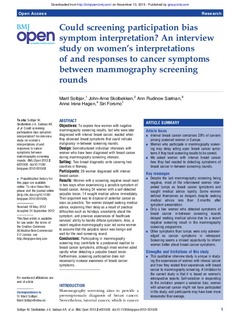| dc.contributor.author | Solbjør, Marit | |
| dc.contributor.author | Skolbekken, John-Arne | |
| dc.contributor.author | Sætnan, Ann Rudinow | |
| dc.contributor.author | Hagen, Anne Irene | |
| dc.contributor.author | Forsmo, Siri | |
| dc.date.accessioned | 2015-11-10T11:23:30Z | |
| dc.date.accessioned | 2015-11-20T15:23:20Z | |
| dc.date.available | 2015-11-10T11:23:30Z | |
| dc.date.available | 2015-11-20T15:23:20Z | |
| dc.date.issued | 2012 | |
| dc.identifier.citation | BMJ Open 2012, 2(6) | nb_NO |
| dc.identifier.issn | 2044-6055 | |
| dc.identifier.uri | http://hdl.handle.net/11250/2365042 | |
| dc.description.abstract | Objectives: To explore how women with negative mammography screening results, but who were later diagnosed with interval breast cancer, reacted when they observed breast symptoms that could indicate malignancy in-between screening rounds.
Design: Semistructured individual interviews with women who have been diagnosed with breast cancer during mammography screening intervals.
Setting: Two breast diagnostic units covering two counties in Norway.
Participants: 26 women diagnosed with interval breast cancer.
Results: Women with a screening negative result react in two ways when experiencing a possible symptom of breast cancer. Among 24 women with a self-detected palpable lesion, 14 sought medical advice immediately. Their argument was to dispose of potential cancer as soon as possible. Ten women delayed seeking medical advice, explaining their delay as a result of practical difficulties such as holidays, uncertainty about the symptom, and previous experiences of healthcare services’ ability to handle diffuse symptoms. Also, a recent negative mammography scan led some women to assume that the palpable lesion was benign and wait for the next screening round.
Conclusions: Participating in mammography screening may contribute to a postponed reaction to breast cancer symptoms, although most women acted rapidly when detecting a palpable breast lesion. Furthermore, screening participation does not necessarily increase awareness of breast cancer symptoms. | nb_NO |
| dc.language.iso | eng | nb_NO |
| dc.publisher | BMJ Publishing Group | nb_NO |
| dc.title | Could screening participation bias symptom interpretation? An interview study on women's interpretations of and responses to cancer symptoms between mammography screening rounds | nb_NO |
| dc.type | Journal article | nb_NO |
| dc.type | Peer reviewed | en_GB |
| dc.date.updated | 2015-11-10T11:23:30Z | |
| dc.source.volume | 2 | nb_NO |
| dc.source.journal | BMJ Open | nb_NO |
| dc.source.issue | 6 | nb_NO |
| dc.identifier.doi | 10.1136/bmjopen-2012-001508 | |
| dc.identifier.cristin | 979534 | |
| dc.description.localcode | This is an open-access article distributed under the terms of the Creative Commons Attribution Non-commercial License, which permits use, distribution, and reproduction in any medium, provided the original work is properly cited, the use is non commercial and is otherwise in compliance with the license. See: http://creativecommons.org/licenses/by-nc/2.0/ and http://creativecommons.org/licenses/by-nc/2.0/legalcode. | nb_NO |
